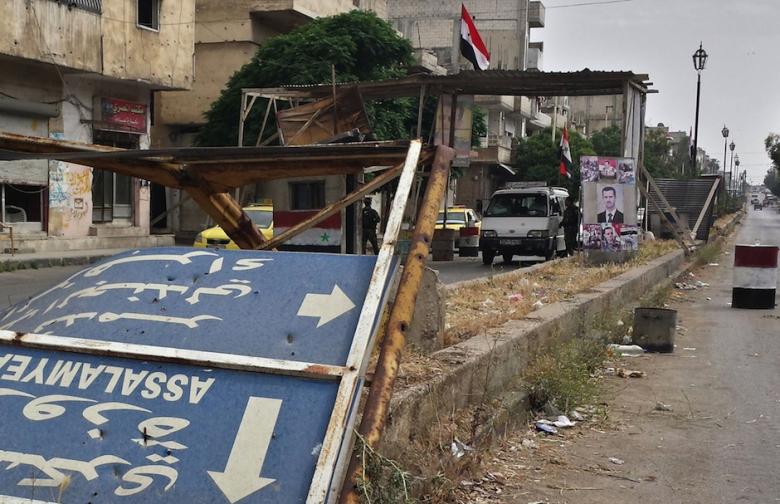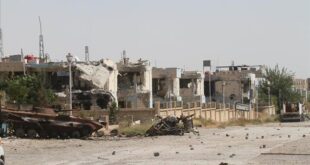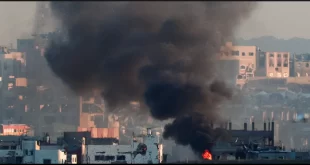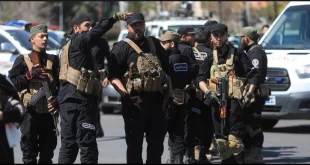
May 8, 2014, al Akhbar
“That’s my daughter. She looks like a boy with her strange haircut. They punished her by cutting her hair, even though she is not even four yet. I don’t know what sin she committed,” one father said after seeing his freed daughter. She was one of the hostages abducted in the eastern Latakia countryside. She is now back in Latakia, after nine months of captivity by Syrian opposition fighters.
Incredulously, according to another freed child, the fighters gouged out the eyes of one of the abducted children who was not part of the deal. The child said, “After that, we knew nothing about him.”
On May 6, the ceasefire deal in the Old City of Homs came into effect but not all the terms of the agreement were observed, including the release of 40 out of 95 civilians the opposition fighters had kidnapped in August 2013 from the eastern Latakia countryside.
Eleven children and four women were released through the checkpoint at the Kefraya village on the outskirts of Latakia. They were then taken to the National Hospital in the city for medical checkups. There was a lot of crying and screaming at the obstetrics and gynecology department, where parents stood waiting for their children after being apart for many long months.
Doctors and soldiers stood between the 15 civilians, listening to stories about their plight and offering them assistance. The faces of those returning to their families had expressions of disbelief. There have been a lot of accusations made against officials, whom many families believe did not do enough for the Latakia captives.
Tears of joy were countered by sorrow and anguish, as in the case of Oum Ali, the woman who was scouring the hospital asking about the fate of her six-year-old boy. Oum Ali asked the freed hostages one by one about her son. She persisted until one woman, a freed captive herself, gave her the shocking answer: “Your son was shot and killed by the fighters months ago.”
Oum Ali was not the only parent to undergo such an ordeal. Many parents had the same experience during that fateful hour when opposition fighters raided the eastern Latakia countryside in August 2013.
Three children from the village of Ballouta, near the town of Salanfa, aged between 5 and 11, returned safely to their father. Speaking to Al-Akhbar, he said, “I can’t believe they came back alive after a painful experience that cost us their mother’s life. She was killed in cold blood as she tried to resist the terrorist kidnapper.” The man was afraid to disclose the names of his children as though he feared the fighters were searching for him outside the hospital.
The freed captives are visibly afraid, including Batoul, a 15-year-old girl. She does not dare criticize the fighters. She took turns explaining to reporters how the hostages were treated well by the kidnappers. She told Al-Akhbar, “We were not harmed. We were held in a large home, after we were divided into several groups, and placed in different rooms of the house.” “We were guarded by 50 fighters. Some of them would remain inside the house. The food was good in general, and they allowed us to shower every five days,” she adds. Batoul could not confirm the location of the house, but she said that she had heard some of the fighters speaking foreign languages.
Other women who were freed came back wearing the full veil. One of them mentioned hesitantly that no one had forced them to wear it, but that they had been told it was “preferable.” She said, “We all wore the hijab. It was natural for us to do as they asked.”
The ceasefire deal in the Old City of Homs includes the release of 40 civilians from the villages of Salanfa in the Latakia countryside, out of more than 95 kidnapped civilians, but not much has been revealed about the fate of the other hostages. Today, 25 civilians are expected to be released and moved out of the opposition-controlled eastern countryside of Latakia.
RELATED ARTICLE: Syria: massacre reports emerge from Assad’s Alawite heartland, Oct 2, 2013, the Guardian
 Syria Support Movement solidarity with the Syrian people
Syria Support Movement solidarity with the Syrian people




